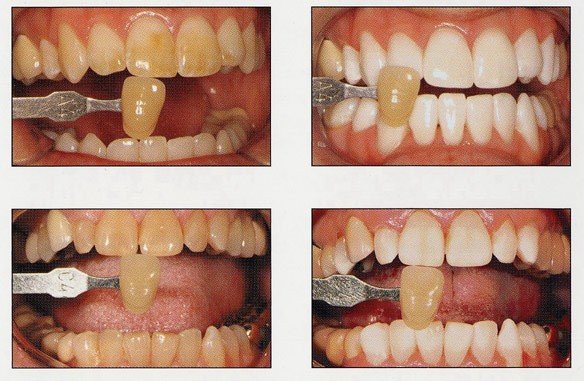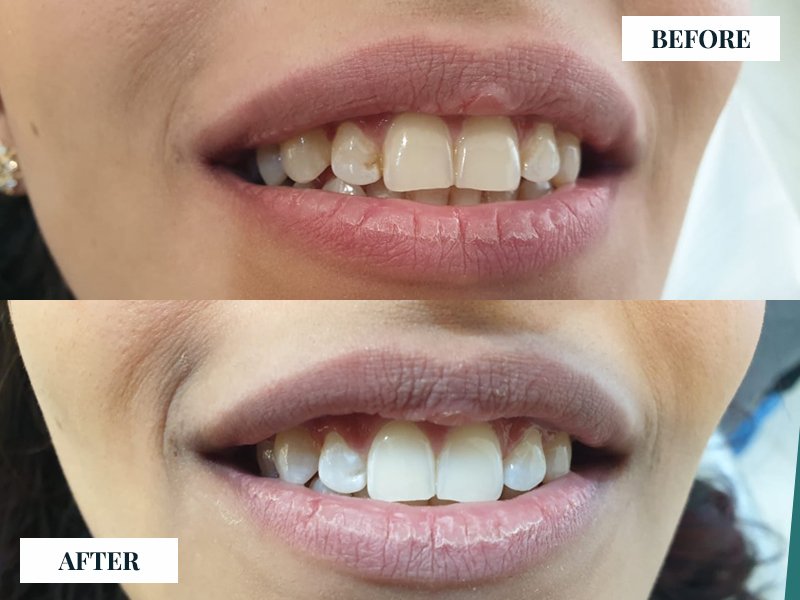Laser teeth whitening is a popular cosmetic procedure used to achieve a brighter, more radiant smile. In this article, we will explore the question that many individuals have on their minds: how long does laser teeth whitening take? This state-of-the-art treatment utilizes cutting-edge technology to effectively remove stains and discoloration from teeth, but the duration of the procedure varies depending on several factors. Read on to discover the average time it takes for laser teeth whitening and gain insight into what to expect during this transformative dental experience.

This image is property of www.godent.com.
Understanding Laser Teeth Whitening
What is laser teeth whitening?
Laser teeth whitening, also known as laser bleaching, is a cosmetic dental procedure aimed at removing stains and discoloration from your teeth. It is a popular and effective method used to achieve a brighter and whiter smile. Unlike traditional teeth whitening methods, laser teeth whitening involves the use of a specialized laser light that activates a whitening gel, resulting in faster and more noticeable results.
How does laser teeth whitening work?
During a laser teeth whitening treatment, a dental professional will first apply a bleaching gel containing hydrogen peroxide to your teeth. This gel is specially formulated to break down stains and discoloration on the tooth surface. After the gel is applied, a laser light is directed towards your teeth to activate the gel and enhance the whitening process. The laser light helps to accelerate the chemical reaction of the gel, allowing it to penetrate deeper into the tooth structure and provide more noticeable results. As a result, you can expect to see a significant improvement in the shade of your teeth after just one session.
Benefits of laser teeth whitening
Laser teeth whitening offers several benefits compared to other teeth whitening methods. One of the main advantages is the speed at which results can be achieved. With laser teeth whitening, you can typically achieve your desired shade in just one or two sessions, whereas other methods may require multiple treatments over a longer period of time. Additionally, laser teeth whitening is often more effective at removing deep stains and discoloration, resulting in a more noticeable and long-lasting improvement in the appearance of your teeth. The treatment is also safe and controlled, as it is performed by a dental professional who can closely monitor the process and adjust the intensity of the laser as needed.
How long does laser teeth whitening last?
The duration of the whitening effect achieved through laser teeth whitening can vary depending on several factors. While laser teeth whitening can provide immediate results, the whitening effect is not permanent. The longevity of the results largely depends on individual habits and maintenance.
Factors Affecting the Duration of Laser Teeth Whitening
Initial tooth color
The starting shade of your teeth influences how long the whitening effect will last. If your teeth were heavily stained or discolored before the treatment, it may take longer for the whitening effect to fade and return to their previous shade.
Severity of stains
The severity of the stains on your teeth can also impact the lasting effects of laser teeth whitening. If your teeth have deep or stubborn stains, it may require more extensive treatment to achieve the desired results. In such cases, the whitening effect may last longer as the stains are more effectively removed.
Number of sessions
The number of laser teeth whitening sessions you undergo can directly affect how long the whitening effect lasts. Multiple sessions can provide a more dramatic and longer-lasting result compared to just one session. Your dentist will assess your teeth and recommend the appropriate number of sessions based on your individual needs and desired outcome.
Strength of the whitening agent
The concentration of hydrogen peroxide in the whitening gel used during the laser teeth whitening procedure can influence the longevity of the whitening effect. Higher concentrations of the whitening agent typically yield more noticeable and longer-lasting results.
Individual differences
Every individual is unique, and their teeth may respond differently to laser teeth whitening. Factors such as genetics, oral hygiene practices, and overall oral health can influence how long the whitening effect lasts for each person. It’s important to follow proper oral hygiene practices and maintain regular dental check-ups to prolong the whitening effect.

This image is property of www.byrdie.com.
Average Time for Laser Teeth Whitening
Duration of a single session
The duration of each laser teeth whitening session can vary depending on the individual case and the severity of stains. On average, a single session usually takes around 60 to 90 minutes. However, this may be shorter or longer depending on the specific treatment plan recommended by your dentist.
Number of sessions required
The number of laser teeth whitening sessions required to achieve the desired results can vary. In some cases, a significant improvement in tooth color can be achieved with just one session. However, for more severe staining or discoloration, multiple sessions may be necessary to achieve optimal results. Your dentist will assess your teeth during the initial consultation and recommend the appropriate number of sessions based on your specific needs and goals.
Total time for complete whitening
Achieving complete whitening can depend on various factors such as the individual’s teeth and the level of staining. In general, most people can achieve their desired level of whitening within two to four sessions. This means that the total time for complete whitening can range from a few days to a couple of weeks, depending on the recommended treatment plan and the response of your teeth to the whitening process.
Tips to Shorten the Whitening Process
Preparation before the procedure
To make the most of your laser teeth whitening treatment and shorten the overall process, it’s essential to prepare your teeth properly beforehand. This includes maintaining good oral hygiene, brushing and flossing regularly, and addressing any existing dental issues, such as cavities or gum disease, as these can affect the effectiveness of the whitening process. Additionally, avoiding staining substances, such as coffee, tea, and tobacco, in the days leading up to your treatment can help improve the outcome.
Taking care of your teeth after whitening
Proper post-treatment care can also contribute to prolonging the effects of laser teeth whitening. It is crucial to follow your dentist’s recommendations regarding diet and oral hygiene practices. Avoiding foods and drinks that are known to stain, such as red wine and berries, can help maintain the whiteness of your teeth. Regular brushing, flossing, and rinsing with an alcohol-free mouthwash also play a significant role in preventing new stains from forming and keeping your teeth looking their best.
Avoiding staining substances
To prevent premature discoloration and maintain the effects of laser teeth whitening, it is advisable to minimize your consumption of staining substances. This includes beverages like coffee, tea, and red wine, as well as tobacco products. If you do choose to consume these substances, it is best to rinse your mouth or brush your teeth shortly after to minimize the chances of new stains developing.

This image is property of eshomdds.com.
Safety and Potential Risks
Safety precautions during the procedure
Laser teeth whitening is a safe procedure when performed by a qualified dental professional. Prior to the treatment, your dentist will carefully examine your teeth and gums to ensure they are suitable for the procedure. They will also provide you with protective eyewear to shield your eyes from the laser light. Throughout the treatment, the dental professional will closely monitor the process to ensure your comfort and safety.
Possible side effects and risks
While laser teeth whitening is generally safe, some individuals may experience temporary side effects. These can include increased tooth sensitivity to hot or cold temperatures, gum irritation, or mild discomfort during or after the treatment. These side effects are typically short-lived and subside within a few days. It is important to discuss any concerns or questions you may have with your dentist before undergoing the procedure.
Alternatives to Laser Teeth Whitening
Over-the-counter whitening products
If laser teeth whitening is not suitable for you or you prefer an at-home option, there are various over-the-counter whitening products available. These include whitening toothpastes, mouthwashes, strips, and gels. While these products can provide some degree of whitening, the results may not be as significant or long-lasting as those achieved with professional laser teeth whitening.
Professional whitening trays
Another alternative to laser teeth whitening is the use of professional whitening trays. These custom-made trays are filled with whitening gel and worn over the teeth for a specified period of time. Professional whitening trays offer a more controlled and convenient at-home whitening option, with results comparable to laser teeth whitening.
In-office hydrogen peroxide treatments
In-office hydrogen peroxide treatments, also known as power bleaching, are another alternative to laser teeth whitening. This procedure involves the application of a high-concentration hydrogen peroxide gel to the teeth, which is activated by a special light. The treatment typically requires fewer sessions than laser teeth whitening and can deliver significant results in a shorter amount of time.

This image is property of www.stunningdentistry.com.
Maintenance and Prolonging Whitening Effects
Regular oral hygiene practices
Maintaining a consistent oral hygiene routine is key to prolonging the effects of laser teeth whitening. Brushing your teeth at least twice a day with a whitening toothpaste, flossing daily, and using an alcohol-free mouthwash can help prevent new stains from developing and keep your teeth looking their best.
Avoiding food and drinks that stain
To maintain the whiteness of your teeth, it is important to avoid or minimize the consumption of food and drinks that are known to stain. This includes beverages such as coffee, tea, red wine, and dark-colored sodas, as well as foods like berries, tomato sauce, and soy sauce.
Touch-up treatments
Over time, the effects of laser teeth whitening may gradually fade due to normal wear and tear and exposure to staining substances. To prolong the whiteness of your teeth, you may consider periodic touch-up treatments. These treatments can be done at your dentist’s office or with at-home whitening products recommended by your dental professional.
Conclusion
Laser teeth whitening is a safe, effective, and convenient way to achieve a brighter and whiter smile. By understanding how the procedure works and the factors that can affect its duration, you can make informed decisions and set realistic expectations. Remember to follow the recommended aftercare guidelines and maintain good oral hygiene practices to prolong the whitening effects. If laser teeth whitening is not suitable for you, there are alternative options available. Consult with your dentist to determine the best teeth whitening method for your individual needs and goals. With the right approach, you can enjoy a dazzling smile that boosts your confidence and enhances your overall appearance.

This image is property of irp-cdn.multiscreensite.com.